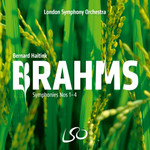|
Back
08/27/2022
Johannes Brahms: Symphony n° 1 in C minor, opus 68 [2] – Tragic Overture, opus 81 [1] – Concerto for Violin and Cello in A minor “Double Concerto”, opus 102 [1] – Symphony n° 2 in D major, opus 73 [1] – Serenade n° 2 in A major, opus 16 [2] – Symphony n° 3 in F major, opus 90 [3] – Symphony n° 4 in E minor, opus 98 [3]
Gordan Nikolitch (violin), Tim Hugh (cello), London Symphony Orchestra, Bernard Haitink (conductor)
Live Recording: The Barbican, London, England (May 17‑18, 2003 [1]; May 21‑22, 2003 [2]; June 16‑17, 2004 [3]) – 244’42
4 SACDs LSO Live LSO0570 (Distributed by [Integral]) – Booklet in English, German and French

   
Not too surprising in his famously long-lived profession, the Dutch conductor Bernard Haitink was still leading symphonic ensembles at the age of 90. In his 10th decade, he led the Vienna Philharmonic at his 90th performance at The Proms in London and the same orchestra in his final concert in Lucerne, Switzerland. Honored with knighthood and national medals, Grammys ©, and a Gramophone Lifetime Achievement Award, Haitink presided in sequence since 1961 at the helm of the Royal Concertgebouw, London Philharmonic Orchestra, Staatskapelle Dresden and Chicago Symphony Orchestra, as well as the ensembles of two opera houses. He was one of the major European conductors of traditional symphonic repertoire in the last half of the 20th and into the 21st century.
But what about his legacy?
Fortunately for us, Haitink lives on in a plethora of recordings enjoying the benefits of modern sound engineering. Under the LSO Live Label, a special treat is in store for music lovers this fall with the release of recordings of Haitink leading the London Symphony Orchestra (LSO) in Brahms’s four symphonies. Under Haitink’s baton, these works create a single universe of sound, the musical architecture of an earlier age harboring the development of ideas stripped to their bare essentials, leading us on a path of power, tenderness and grandeur.
What strikes me most emphatically about Haitink’s take on this familiar foursome is the consistency of vision and an unwavering commitment to let the music speak Brahms’s truth. The conductor never relinquishes his indebtedness to the composer for four unique symphonic works so utterly in tune with each other, bringing freshness and serious reflection through compositional patterns—sonata form, theme and variations—that were fast becoming threadbare even in Brahms’s time. Gratuitous emotionalism and sloppy playing have no place in this carefully crafted, meticulously articulated expression of deep human feeling. From the mysterious heartbeat of the timpani that launches the Symphony n° 1 to the 30 brief variations that conclude the Symphony n° 4, Haitink and the LSO deliver performances that envelop us in an irresistible caress.
Recognizing that he would be judged by standards established by Beethoven, Brahms lingered uneasily for years over the composition of the first symphony. The final product is, indeed, a tribute to the earlier composer, with use of the four-beat motif from Beethoven’s Fifth, the key of C minor (a favorite with Beethoven) and dramatic declarations of grandeur and majesty, often in the form of a bold declaration in the horns. The overall trajectory of the music in Brahms’s Symphony n° 1, opus 68, deliberately models itself after sections of Beethoven’s Ninth, as though the more recent composer were picking up where the earlier master left off. These tributes could easily take on the aura of affectation, but not so in Haitink’s interpretation. The conductor points us to undercurrents of sound we may not have noticed before, such as the restless pizzicato pacing of the lower voices, not only in the first movement, but situated throughout Brahms’s entire symphonic cycle. On the minus side, I found the woodwind solo passages pale in comparison to the full ensemble, and sometimes barely audible. A bit of touching up in the sound lab would have allowed these soloists to shine.
The Symphony n° 2 in D major, opus 73, is much breezier fare, gusts of melody rushing and receding among the silky strings. Such clarity and pure tone! This symphony has a pastoral feel with imaginative variations, foretelling the final moments of this cycle. Haitink brings a melancholy air to the Symphony n° 3 in F major, opus 90, with the yearning F‑Ab‑F motif in the first movement and haunting lament of the third, which played an important role in the 1961 romantic film, Goodbye Again. Who, having seen it, can forget that scene in the Salle Pleyel: Ingrid Bergman in pearls, luxuriating in the sound of Brahms, her face aglow with delight.
The Symphony n° 4 in E minor, opus 98, brings us to the conclusion of a Brahms cycle notable for its warmth and well communicated understanding of the totality of these works, delineating charms which may have been hidden in earlier readings. I always find the Fourth ends too suddenly for my taste, but perhaps it is just because I want it to go on forever.
Lovers of Brahms may experience the next best thing with this album, though, since it includes three more symphonic works under Haitink’s baton: the Tragic Overture, the Double Concerto, and the Serenade n° 2. In truth, I was a little disappointed with two of these add-ons. The performance of the overture proved a little stilted and dry, while the first two movements of the Double Concerto were unremarkable. This improved in the spirited final movement, which contained some pleasant symmetries and solid orchestral sonorities. The very best of these three performances, which neatly pad out the CD set to four discs, is the lovely Serenade n° 2, a work that just keeps delivering through five movements of pure beauty, exquisitely conveyed by the happy synchronicity of Haitink and the LSO. It’s a musical tartine for woodwinds and a feast for our hearts.
Linda Holt
|